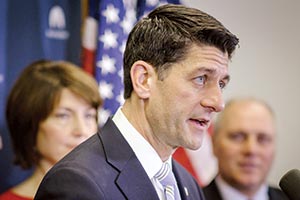Senior Reporter
Congress Seeks Short-Term Fix With Funding Through March 31

This story appears in the Nov. 28 print edition of Transport Topics.
President-elect Donald Trump may be weeks away from his inauguration, but he already is putting his stamp on what happens on Capitol Hill.
When Congress reconvenes for the lame-duck session Nov. 28, congressional Republican leaders indicated they would set up votes on legislation that would keep the government funded through March.
The Republican leaders acknowledged the Trump transition team had expressed interest in a short-term funding measure to give the new administration the chance to influence fiscal 2017 budget priorities. In congressional parlance, a short-term funding measure that maintains the status quo is known as a continuing resolution.
“Well, I think the new incoming government would like to have a say so on how spending is to be allocated in 2017. And so we are working with the new incoming government, the new Trump administration, on the timing of that on the continuing resolution,” House Speaker Paul Ryan (R-Wis.) told reporters earlier this month.
When the continuing resolution has run its course, an omnibus fiscal 2017 bill is likely to be taken up under the Trump administration, which is expected to promote conservative fiscal ideals. For trucking, policy riders to be added to a funding bill could well include an update to hours-of-service rules for drivers and a pre-emption of meal-and-rest break regulation by states.
Democratic leaders cried foul over the Republicans’ intention to opt for a continuing resolution, insisting that budget negotiations would add too many tasks on the Trump administration’s docket next spring.
“I think that they’re making a big mistake for themselves. They’re gonna have a kettle of fish in March that they can’t even imagine. And it’s too bad that we couldn’t have it gone ’til next September,” House Minority Leader Nancy Pelosi (D-Calif.) said.
Prior to the elections, Republican funding leaders were eyeing legislation that would keep federal agencies functioning through Sept. 30 — the remainder of fiscal 2017. An omnibus is the term for legislation that would fund the balance of a fiscal year and involve changes from previous budgets.
Trump vowed to start his first term by advancing myriad policy reforms, such as a $1 trillion infrastructure investment plan. The proposal for new pipelines, roads and bridges already has garnered bipartisan backing. The Democratic leader in the Senate said his party would be open to negotiating on infrastructure funding with the new president.
“Surprisingly, on certain issues, candidate Trump voiced very progressive and populist opinions,” incoming Senate Minority Leader Charles Schumer (D-N.Y.) said during a televised interview Nov. 20, citing Trump’s proposal for an infrastructure bill. “These are things the Democrats have always stood for and frankly Republicans have always been against.”
Schumer warned that if his administration were to backtrack on infrastructure, Trump would be “breaking his promise to particularly the blue-collar workers, many of whom voted for him on those particular issues.”
The Trump team is proposing $137 billion in tax credits as a way to lure private investors to build big-scale projects. The proposed tax credits, which Congress would need to authorize, would result in a $1 trillion investment in infrastructure over a decade, argued the Trump campaign.
“This innovative financing option would serve as a critical supplement to existing financing programs, public-private partnerships, Build America Bonds, and other prudent funding opportunities,” Trump campaign advisers Wilbur Ross and Peter Navarro wrote in October.
Since the elections, transportation and industry stakeholders have been embracing legislative talk about increasing infrastructure funds for upgrades to freight corridors.
“The stakes are indeed high, but overall if the program is implemented, it will result in a big win for American business and American workers,” said Jean DellAmore, president of Stertil-Koni, a provider of heavy-duty vehicle lifting systems. “The reason is clear: It will spur jobs and manufacturing in multiple regions of the country, including the Rust Belt.”

